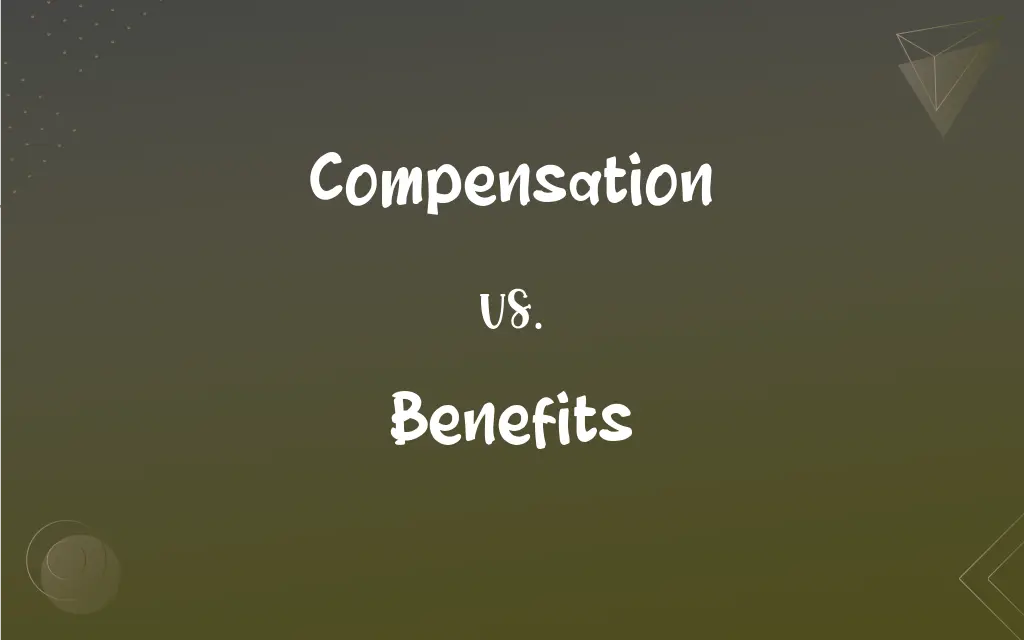Compensation vs. Benefits: What's the Difference?
Edited by Janet White || By Harlon Moss || Updated on October 23, 2023
Compensation refers to monetary wages or salaries, while benefits encompass non-monetary perks like health insurance or retirement plans.

Key Differences
Compensation is the financial reward an employee receives in exchange for the services they provide to an organization. It predominantly takes the form of salaries, wages, bonuses, or commissions. Benefits, on the other hand, are non-monetary advantages provided to employees, often enhancing their overall compensation package.
While compensation directly addresses the immediate financial needs of employees by offering them a steady income, benefits cater to long-term well-being and security. Benefits can encompass health and dental insurance, retirement contributions, and even educational assistance.
The negotiation of compensation is often straightforward, based on factors like experience, job role, and industry standards. Benefits can be more diverse, with companies customizing packages to attract and retain talent, ranging from gym memberships to childcare support.
It's noteworthy that while compensation is typically taxable, certain benefits can provide tax advantages. For instance, contributions to certain retirement plans or health savings accounts, which fall under benefits, can reduce taxable income.
In essence, compensation is the tangible, monetary part of what an employee earns, and benefits represent the additional perks and advantages that come with a job, providing holistic support to an employee's life and career.
ADVERTISEMENT
Comparison Chart
Nature
Monetary
Non-monetary
Purpose
Immediate financial needs
Long-term well-being and security
Examples
Salaries, wages, bonuses
Health insurance, retirement plans
Tax Implications
Typically taxable
Can offer tax advantages
Negotiation Factors
Experience, job role, industry standards
Company's intent to attract and retain employees
ADVERTISEMENT
Compensation and Benefits Definitions
Compensation
Compensation is the primary financial reward for employment.
With her skills, she was able to secure higher compensation.
Benefits
Benefits enhance an employee's overall compensation package.
One of the job's key attractions was its comprehensive benefits.
Compensation
Compensation can be structured as hourly, weekly, or annual pay.
His compensation was set at an hourly rate for the freelance work.
Benefits
Benefits offer long-term support and security to employees.
She chose the job partly because of its retirement benefits.
Compensation
Compensation encompasses salaries, wages, and bonuses.
He negotiated his compensation to include a higher base salary.
Benefits
Benefits are non-monetary perks provided to employees.
The company offers health and dental benefits.
Compensation
Compensation can vary based on experience and role.
Senior managers often receive higher compensation than junior staff.
Benefits
Benefits can range from insurance to educational support.
The company's benefits include tuition reimbursement.
Compensation
Compensation is the monetary payment given to employees for their work.
Her compensation for the project was above industry average.
Benefits
Benefits can provide tax-saving opportunities.
Making pre-tax contributions to health benefits reduced her taxable income.
Compensation
The act of compensating or the state of being compensated.
Benefits
Something that promotes or enhances well-being; an advantage
The nurse explained the benefits of regular exercise.
FAQs
How is compensation typically determined?
Compensation is often based on experience, job role, and industry standards.
Are all compensation amounts taxable?
Most compensation is taxable, though certain types, like specific reimbursements, may have tax exemptions.
Why do companies offer benefits?
Companies provide benefits to attract, retain, and support the well-being of their employees.
Is a bonus considered compensation or a benefit?
A bonus is a form of compensation since it's a monetary reward.
What are benefits?
Benefits are non-monetary perks provided to employees, like health insurance or retirement plans.
Can benefits be exchanged for higher compensation?
This is at the discretion of the employer. Some might allow such negotiations, while others won't.
Are retirement plans considered benefits?
Yes, retirement plans, like 401(k)s, are a common employment benefit.
What is compensation?
Compensation is the monetary reward an employee receives for their work, such as salaries or wages.
Can benefits be considered a form of compensation?
While benefits enhance an overall compensation package, they're non-monetary and distinct from direct pay.
Are benefits mandatory for employers to provide?
While some benefits, like certain insurances, may be mandated, many are optional and vary by company.
How often is compensation typically paid?
Compensation is usually paid on a set schedule, such as weekly, bi-weekly, or monthly.
Can an employee decline benefits?
Yes, employees can typically choose to opt out of certain benefits.
What's an example of a common benefit?
Health insurance is a common benefit many employers offer.
What's the difference between base pay and total compensation?
Base pay is the fixed salary or wage, while total compensation includes base pay plus bonuses, commissions, and the value of benefits.
Can an employer change compensation without notice?
Generally, employers should provide notice and may need consent to alter compensation agreements.
Do all employees get the same benefits?
Benefits can vary based on job role, tenure, and company policies.
Can compensation be negotiated?
Yes, compensation is often negotiated based on factors like experience and the specific job role.
Is overtime considered compensation?
Yes, overtime pay is a form of compensation for hours worked beyond standard thresholds.
Are commissions a form of compensation?
Yes, commissions are monetary rewards based on performance and are a type of compensation.
Do benefits offer tax advantages?
Yes, certain benefits, like retirement contributions, can provide tax-saving opportunities.
About Author
Written by
Harlon MossHarlon is a seasoned quality moderator and accomplished content writer for Difference Wiki. An alumnus of the prestigious University of California, he earned his degree in Computer Science. Leveraging his academic background, Harlon brings a meticulous and informed perspective to his work, ensuring content accuracy and excellence.
Edited by
Janet WhiteJanet White has been an esteemed writer and blogger for Difference Wiki. Holding a Master's degree in Science and Medical Journalism from the prestigious Boston University, she has consistently demonstrated her expertise and passion for her field. When she's not immersed in her work, Janet relishes her time exercising, delving into a good book, and cherishing moments with friends and family.































































